
PhD students from the School of Women and Gender Studies (SWGS) have been advised to prioritize their PhD program irrespective of the other forces pulling them. It was observed that once admitted, most PhD students sit back and regard their PhD Journey as secondary. Students have been called upon to carry on with all the determination they had at the time they were applying.
This was during the first schools PhD Progress meeting held on 21st September 2023 that brought together continuing PhD students, Graduate coordinators, supervisors and the college administration and staff from the Directorate of Graduate Research and Training held in the CHUSS Smart room.
The Coordinator Graduate programs SWGS Dr. Ruth Nsibirwano said, the meeting was one of the strategies that the school has to support the students to be able to accomplish their PhD journeys on time.
“In the past we have observed that students remain on the program for a very long time and possibly one of the ways that we can break that cycle is to meet regularly with them , listen to what they have to say, understand their challenges , give them information on the available infrastructure and remind them on what the university policies say about their admission and, in that way, they will be able to complete on time, and also feel that they belong to this research-led university,” Nsibirwano explained.
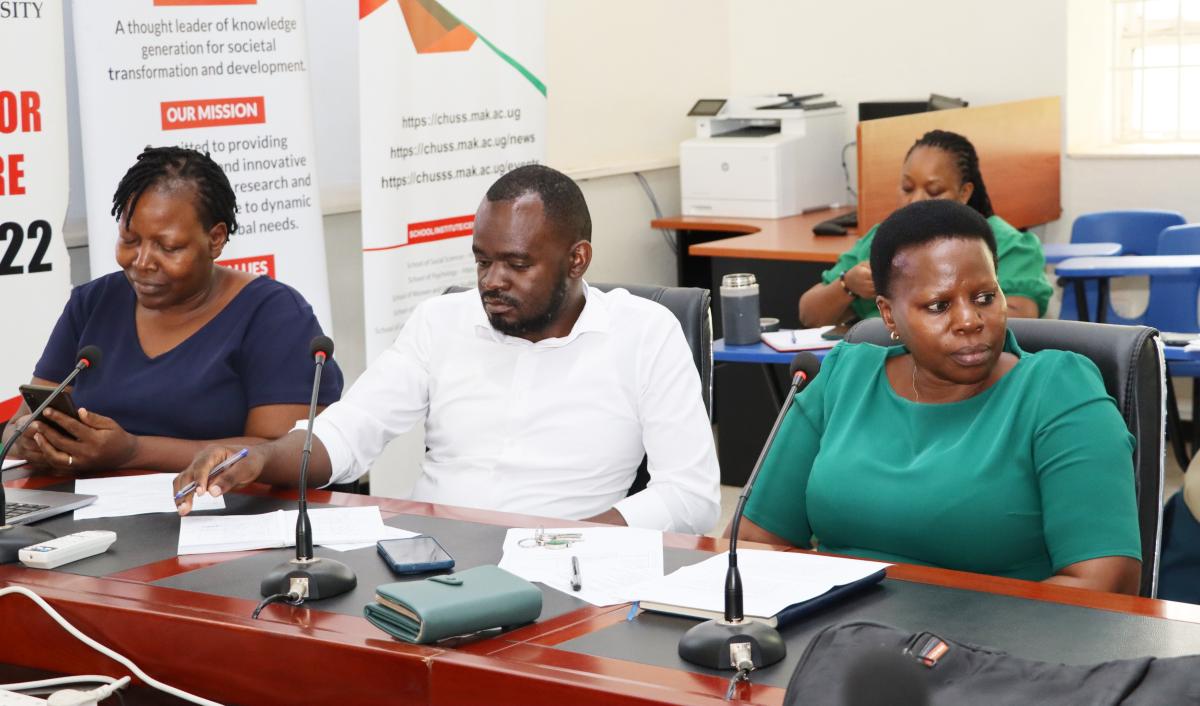 From this interaction, Dr. Nsibirwano observed that students were not aware of what they are expected to do. Although the university has many opportunities and spaces for PhD students to read in, Nsibirwano noted that many were not aware of theses spaces.
From this interaction, Dr. Nsibirwano observed that students were not aware of what they are expected to do. Although the university has many opportunities and spaces for PhD students to read in, Nsibirwano noted that many were not aware of theses spaces.
“Many of them out of excitement apply for PhD programs and they are admitted but then after admission, they have a gap in knowledge . They do not know where to start, who to go to, what the university has in place for them, what offices they can go to if they need support, and the spaces for PhD for use in their time of study
..and the reason is, the students are also not in touch neither with the school or college and university. Their contacts only remains at the point where they get admission letters. So, we want to bridge that gap so that PhD students also have a proper connection to sources of information”, She said.
As they turn up for this graduate journey, Nsibirwano implored students to keep in touch.
”It is normal for them to feel lost, to feel it is a challenge and to even regret for having taken a decision to undertake a PhD but it is a normal process that those who came before, have gone through and have persevered. PhD students need to remain focused and persevere. Whatever they have started can be accomplished if they have the determination and maintain the momentum that they started with” Dr. Nsibirwano added
In her opening remarks, the Principal College of Humanities and Social Sciences Prof. Josephine Ahikire cautioned students to desist from hear sayings about the PhD assuring the students of the clear university processes and support systems to enjoy their graduate journey at CHUSS.
Prof. Ahikire expressed excitement that the faculty was meeting with students, thanking the school and college coordinators for organizing the meeting on grounds that sometimes PhD students come and disappear.
“That is not what we want. We want to support you as a college and in three years’ time , we should be processing your examination and in the fourth year, you graduate and it is possible.
Please do not listen to this thing, “they said”. The school is showing you the people that are responsible. DRGT, the college, coordinators, the Deans and heads of departments and registrars are there to support graduate programs”, the Principal advised.
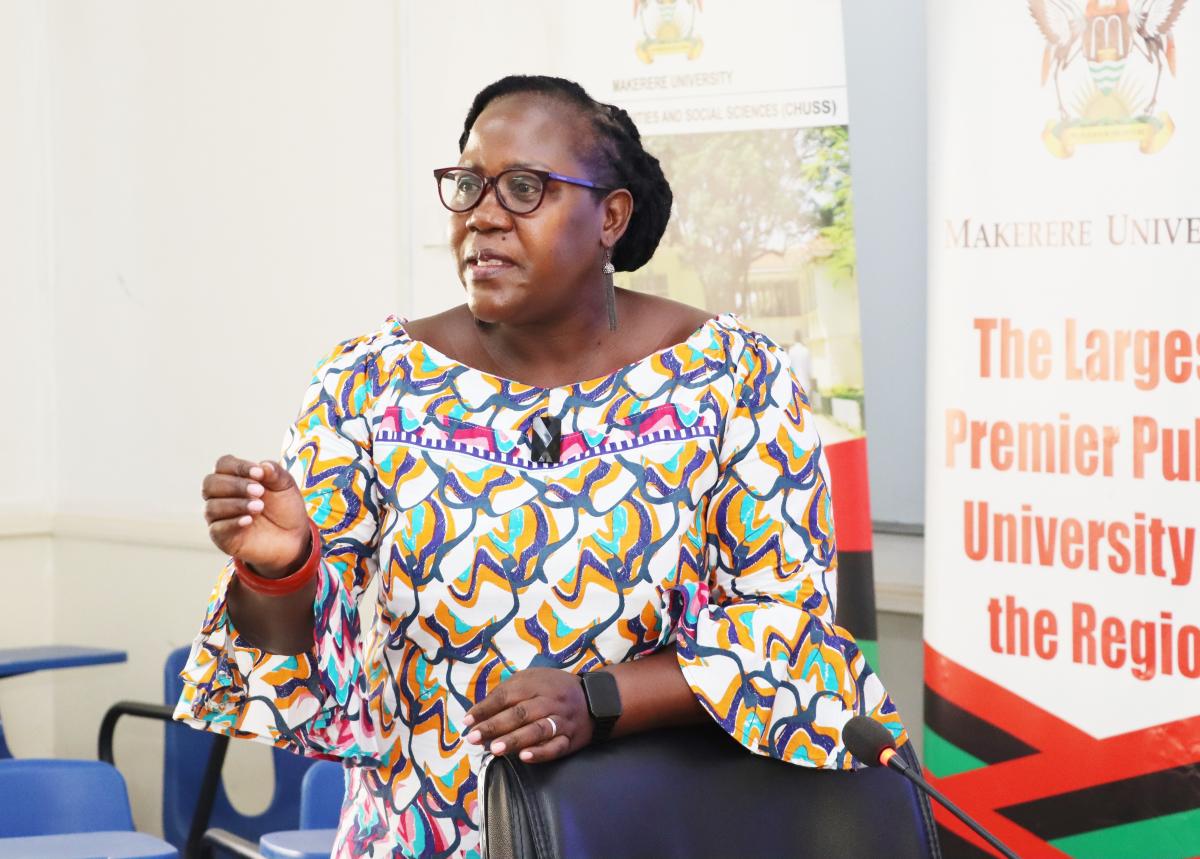 Describing students as central, Prof. Ahikire assured them that the college is committed to ensuring they complete on time.
Describing students as central, Prof. Ahikire assured them that the college is committed to ensuring they complete on time.
“ Gender studies is an exciting discipline but which also requires some inventiveness , reading and deep engagement with the literature, the research topic chosen and it would be good and advisable to attend some of the theory-based courses at Masters level to refresh and deepen some of your passion.” Prof. Ahikire said adding that the Deans, Principals and other offices were open to students .
Stick to your study plan and perform your administrative roles-Principal Registrar, DGRT
Representing the Directorate of Graduate Research and Training, the Principal Registrar Ms. Prossy Nakayiki underscored the need for students to stick to their study plans and always remember their roles within the university.
Besides the research, supervision and the academic part, Ms. Nakayika told students that they have other administrative requirements they are supposed to address as students including the need to enroll and register.
Nakayiki said, much as students are admitted within different times, they fall within different cohort and attention should be focused on the different registration dates knowing that the proposal must be written within one year.
“The challenge is at times when given that letter, even in one year we spend over two years or three on a provisional admission. The current policy is you are given up to a maximum of two years within which you should have developed a proposal and also defended as you wait for a recommendation from the higher degrees and research committee. Where you spend more than two years, consider your admission to have expired”, meaning, you have to re-apply” , Ms. Nakayiki warned.
On receipt of the provisional admission, students were advised to go to the school registrar to make sure they register for that provisional letter but before that, they must ensure they have paid all the fees in the course of one year given.
“The other thing to note is that before you are issued a full admission letter one of the things we confirm is that you paid all the fees as indicated in the provisional admission letter. So I urge all of you to make sure that you specifically register for provisional admission.
You are given a maximum of two years within which to defend your proposal and get full admission. If the two years elapse before you defended, then that admission is cancelled because management has noted that at times students spend more than four years on provisional admission yet this is the total duration within which you are supposed to complete your PhD Program”, She explained
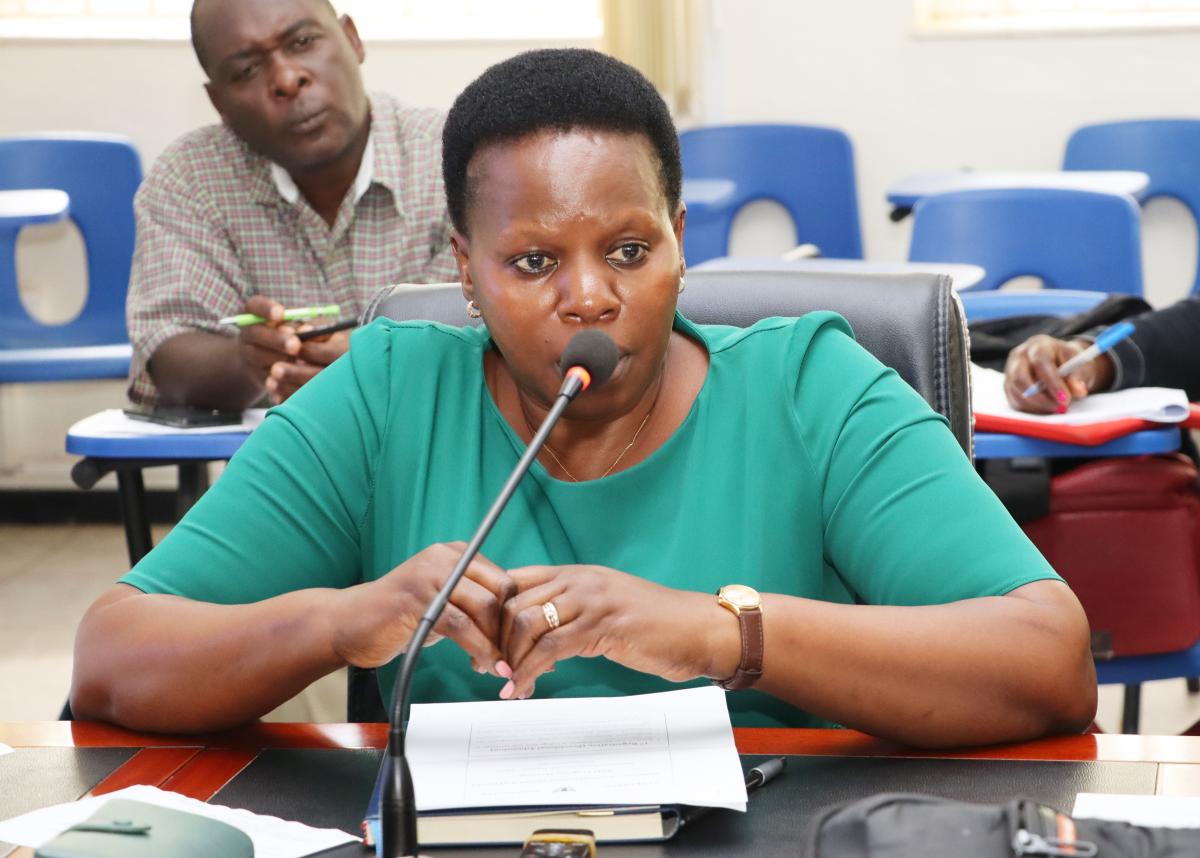 Explaining the study plans and milestones that students are expected to achieve during each year, Nakayiki said, besides registering with the school registrar as first years, students are supposed to be developing draft proposals within the first months of the provisional admission letter and attending all the relevant courses.
Explaining the study plans and milestones that students are expected to achieve during each year, Nakayiki said, besides registering with the school registrar as first years, students are supposed to be developing draft proposals within the first months of the provisional admission letter and attending all the relevant courses.
She told students that the DGRT organizes cross cutting courses and urged them to respond to the adverts and apply early enough adding that the directorate was devising means to offer them online. During the provisional admission, she said, DGRT organizes courses for proposal writing, scholarly writing and research methodology.
Nakayiki encouraged students to attend the seminars organized by departments and schools, review their study plans with supervisors and to draft proposals and submit progress reports every after six months.
“When you submit the 6 months report, it informs the school to know whether you are progressing well or having challenges to guide how to address the challenges with either supervisor or along your academic journey”, she stated.
In year two which is the first year of full admission, Nakayiki asked students to pay annual school fees as indicated in the provisional admission letters except for ID fees paid once . Students according to Nakayiki, are also expected to start on data collection to work with the doctoral committee and submit the progress report after 6 months.
“Progress reports are a requirement every after the six months and a copy submitted to the DGRT particular, the records office for the students file”, she said
In year three, Nakayiki explained that students are expected to continue with field work, data analysis and start drafting chapters of the theses as they present in seminars and it is again, in year three they are expected to present the first paper.
“Fourth year basically is your final year on the PhD, some finalizing data analysis and expecting the writing process to begin and then develop a draft thesis to share with supervisors and again present a second paper as you publish.
At time of graduation a PhD student must have published two papers. You are also expected to finalize with the writing, then submit for exam on approval by supervisors”, she said.
Nakayiki urged students to ensure that at least three months towards submission, they are supposed to submit an intent to submit to enable the school or department to start identifying the examiners to avoid the delay of the examination process.
She said, it is only after submitting that the DGRT stops charging fees. After submission of the theses the students have to fill a form signed by the supervisor and the Dean capturing the date of submitting the examination, a copy of which is submitted to DGRT records office notifying that the student has completing his or her role and that the delays that come thereafter, do not concern the student.
Nakayiki also highlighted the guidelines to do with withdrawal and extension due to other forces and challenges students may meet. She explained that when withdrawing, students are supposed to notify the school and fill a specific form. The Dean of the school and through supervisors will consider the request, with the higher degrees school to grant or deny and write back.
She said the student is given a maximum of two withdrawals and, not, in two concurrent years. Information to grant is by the school and or college so, DGRT is notified of the withdrawal for filing.
“Any student who overstays on program beyond the stipulated period will be deregistered. For PhD, they are given a max of five years as a normal student. After deregistering, the consideration for re-instatement is within the two years of deregistration. If you fail to complete within seven years, you are deregistered and reinstatement granted cannot exceed one year but if the school realizes that u cannot finish, then, you are completely deregistered”, she warned.
The Role of the student in the supervision process
Ms. Nakayiki also shared the guidelines on the role of students in the supervision process.
As students, she said they are expected to conduct themselves in a mature, professionals and in a civil manner in all interactions with supervisors and the rest of the staff at the college, despite their social or economic status and , comply to the request for information in a timely way and meet deadlines to avoid falling out with supervisors on time lines that may breed misunderstandings.
In unusual circumstances where students cannot fulfill the commitments as required, students were advised to apply for a withdrawal or notify supervisors and heads of departments and school deans.
As students, Nakayiki advised that they are expected to recognize that academic supervisors provide the intellectual and instructional environment in which they are supposed to conduct research.
“You are also expected to exercise the highest integrity in collecting, analyzing and presenting research data where the issue of plagiarism comes in. You also have to take responsibility to keep reminding yourself of the regulations and policies governing your studies and communicate regularly with academic advisors especially on matters related to research and progress within the graduate program”, Nakayiki stated,
She cautioned that before writing officially on change of supervisor, students should have a conversation with the coordinators and the dean of the school to see where the challenges are and how to minimize the challenges that may delay the academic journey that comes with the financial burden.
Experience sharing from students at different stages of a PhD
Agnes Baluku an administrative staff from Busitema University sponsored by Sida enrolled in 2017 whose original topic was on Gender dynamics women find in sports leadership had already submitted thesis for examination .
She described the PhD journey as both challenging but also interesting.
Narrating her frustrations and challenges with finances, balancing work and family relationship, her attitude towards academic supervision and the pressure of meeting deadlines among others, Baluka appreciated how attending cross cutting courses in philosophy of methods turned around her negative thoughts towards a successful PhD journey.
From unsupportive spouse, to pregnancy and baby , with her worst experience of the eventual loss of spouse to CoVID-19, Baluka shared strategies she adopted to keep going and the benefits that have come with her PhD studies.
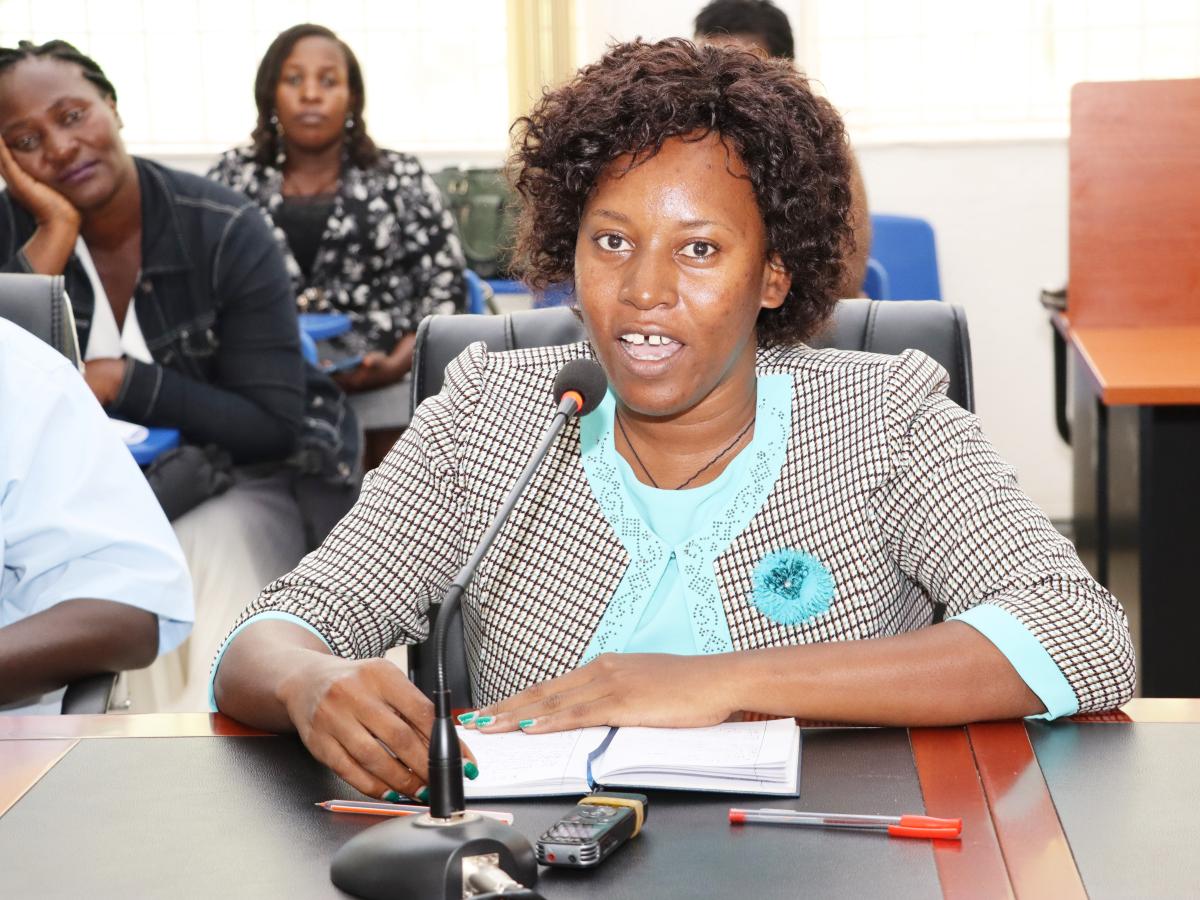 “My supervisors were so motivating. The first time I presented I was guided by the doctoral committee. It was during the cross cutting course that I was guided to have positive thinking . I started creating friendship and researched about everyone I met.
“My supervisors were so motivating. The first time I presented I was guided by the doctoral committee. It was during the cross cutting course that I was guided to have positive thinking . I started creating friendship and researched about everyone I met.
I carried my baby to DAG school to enable me read , went out for sports and sometimes clubbing.
I have benefitted through building networks. I am good at writing grant proposals and won several. I started a Community-based Organisation and out of my PhD, I can publish papers. I thank my supervisors, the doctoral committee for the support and Sida for the scholarship”, She said.
Esther Flavia Nabuguza , a continuing PhD student did not foresee financial challenges ahead but was grateful for the systematic encouragement.
After completing her proposal, Nabuguza said, she shared the proposal during a networking session that won her a grant from Stanbic Bank which picked interest in her project on Climate smart agriculture and women in Northern Uganda.
“I had that opportunity. Speak about what you are doing. Be confident and let people know what you are doing. I had the gender angle well aligned and clear.” she said.
Nabaguza was grateful for the support from supervisors and told fellow students that the school may not have adequate infrastructure, but the university and college have the infrastructure to support system for graduate studies.
Never Give Up, Others have Made it- Faculty advise students
Senior faculty member Dr. Henry Manyire advised students never to give . Manyire said everything about a PhD is exciting and frustrating adding that time may come when they will have self-doubt but, all successful students have gone through it.
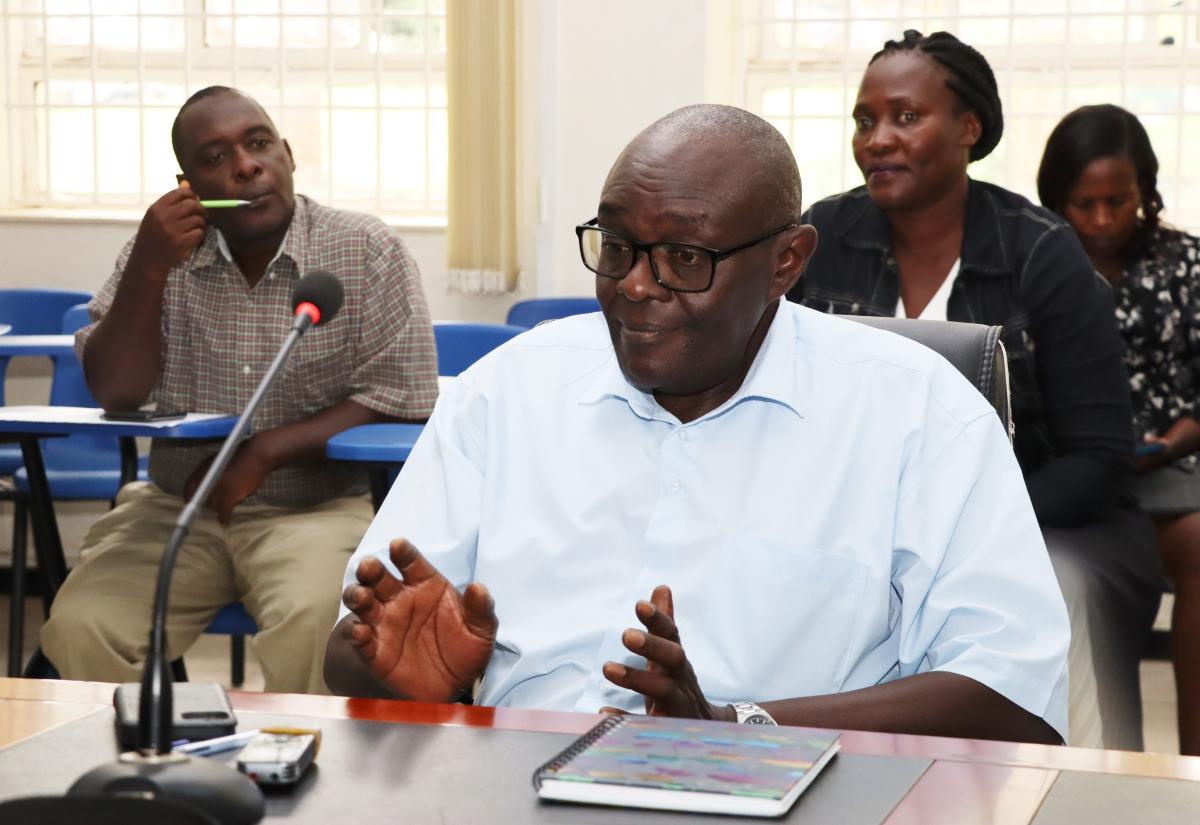 “It is at PhD level where you are interrogating something, reading a lot and making sense about what others have done. Solutions are not in books but in your mind. The process of thinking can even go for months without making sense of what you are writing. This is what students call frustration”, He observed.
“It is at PhD level where you are interrogating something, reading a lot and making sense about what others have done. Solutions are not in books but in your mind. The process of thinking can even go for months without making sense of what you are writing. This is what students call frustration”, He observed.
Describing Gender insecurities as real and part of human feeling, Dr. Manyire advised students to navigate and find ways of moving out of such insecurities with family and spouses.
“You will find obstacles from supervisors, family, colleagues, at work because all are humans. Sometimes supervisors have to read and go back to class to read about what they are supervising. Nobody has done a PhD without frustrations but whatever obstacles, you will succeed. What I have learnt is that after going through the PhD, you become humble”, he said
Dr. Fredrick Kindi said the PhD journey can be lonely but working wth supervisors can be encouraging.
The most important thing according to Dr. Kindi is to focus on finishing the PhD and to be appreciative of the comments from supervisors.
“For every statement you write, you should be able to qualify it Note key concepts in your study and be able to explain. Opponents read through all chapters and paragraphs. You must be prepared and well versed with your book”.
Dr. Kindi advised students to always reflect on what is new that they have written . Having written the document, he challenged the students to ask how they have been changed with what they have written.
The CHUSS Graduate programs coordinator Dr. Zaid Sekito implored students to utilize the infrastructure and systems that the college offers.
Dr. Sekito said the college has the graduate coordinating office, reading space for PhD students and the WhatsApp group for information sharing.
“For cross cutting courses, we call all those interested to attend to apply. Before you graduate, you should have attended at least three introductory courses that usher you in the doctoral program”, Dr. Sekito advised
